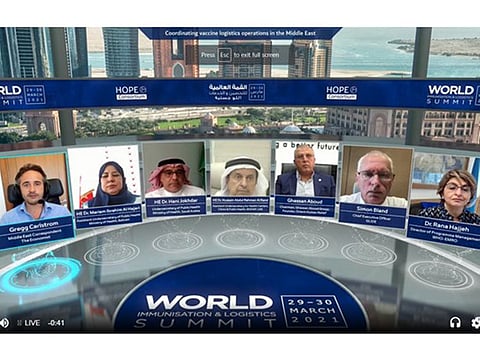Hope Consortium hailed as timely effort to ensure equitable COVID-19 vaccine access
Abu Dhabi as logistics hub can help conflict-ridden, needy countries deliver vaccines

Also In This Package
Abu Dhabi: The Abu Dhabi-led Hope Consortium has been hailed as a timely initiative that can help ensure equitable access to COVID-19 vaccines for vulnerable populations in the region.
Sheikh Abdullah bin Zayed Al Nahyan, UAE Minister of Foreign Affairs and International Cooperation, said that the Consortium will “mobilise UAE expertise to provide more than six billion doses of the vaccine in 2021, including ensuring equitable access of the vaccine to the needy in over 170 countries”. It is this role that is especially important, given that half of the 22 countries in the Eastern Mediterranean region are currently facing some form of conflict, delegates from humanitarian organisations said on the second day of the World Immunisation and Logistics Summit.
Unequal impact
“The COVID-19 pandemic has affected us all in one way or another, but very unequally. People and communities affected by armed conflict or other types of violence have been the hardest hit — people like those in Syria, Yemen and northeastern Nigeria. Less than 50 per cent of health care facilities [in these area] were functioning even the pandemic struck, and the pandemic is one more deadly concern among many others,” said Robert Mardini, director general of the International Committee of the Red Cross.
The Eastern Mediterranean region includes the majority of Arab countries, as well as Pakistan, Afghanistan and Iran.
Hard-to-reach populations
“Ensuring equitable access to vaccines is a major concern, especially for people in hard-to-reach areas, displaced peoples, detainees and those in forgotten communities. There are also currently 65 million people living in areas under the control of non-state armed groups, and they are excluded from basic services like health care. That is why the Hope Consortium is so timely and so important,” he added.
The Consortium is a public-private partnership, led by Abu Dhabi health care regulator, the Department of Health (DoH), which aims to set up the UAE capital as a logistics hub for vaccine delivery. It is supported by the cargo division of Etihad Airways, Etihad Cargo, Abu Dhabi Ports, container solutions provider SkyCell, procurement firm Rafed and digital security provider Maqta Gateway. Combining their resources, the Consortium can safely store vaccines at a range of temperatures, and track vaccine shots till the last mile.
UAE efforts
The two-day summit was another effort by the Hope Consortium, formed in December 2020, to discuss challenges in COVID-19 vaccine development, manufacture and delivery, including for the WHO’s COVAX (COVID-19 Global Vaccine Access) initiative, an international effort to ensure vaccine access.
“The UAE supports the COVAX initiative through a partnership with UNICEF to store vaccines at the International Humanitarian City in Dubai. It has also joined the Friends of COVAX Facility to support various vaccines efforts aimed at ensuring universal within affordable costs and in an equitable manner,” Sheikh Abdullah said on the first day of the summit.
Needs in conflict areas
Ghassan Aboud, founder of humanitarian organisation Orient Human Relief, highlighted the great need for vaccine storage and delivery capabilities in conflict-ridden areas. Having worked with vulnerable populations in Syria, he said vaccine providers will have to overcome hurdles like the lack of refrigeration and electricity for storage, the lack of trained human capital for vaccine delivery, and infrastructure-related difficulties in getting vaccines to people in rule and hard-to-reach areas,
“Vaccination work may also have to be carried out amid missiles and air strikes, and for people who mistrust the process or do not have any state identification,” Aboud stressed.
Vaccine access
In fact, two nations in the Eastern Mediterranean — Yemen and Libya — have not even begun vaccinating their populations yet, even though health experts have repeatedly stressed that no one in the world is safe from COVID-19 unless everyone is vaccinated and the virus is prevented from spreading and mutating.
Dr Rana Hajjah, director of programme management at the World Health Organisation’s Eastern Mediterranean Regional Office, said Yemen will receive its first doses by the end the month, and Libya will hopefully also receive COVID-19 vaccines by mid-April. But she issued a strong plea to regional governments and private sector players.
Include the vulnerable
“With regard to vulnerable populations, we encourage countries to encourage refugees and migrants as part of national vaccine deployment plans. This is a plea. We are struggling to make sure everyone in the region is covered, because there is no global health security unless everyone is vaccinated. As long as the coronavirus continues to circulate, there will be mutation and other variants, and closing down borders can only provide short-term protection [to any nation],” Dr Hajjah said.
The expert also called upon governments to eschew vaccine nationalism and politics in their bid to protect the vulnerable within their borders.







